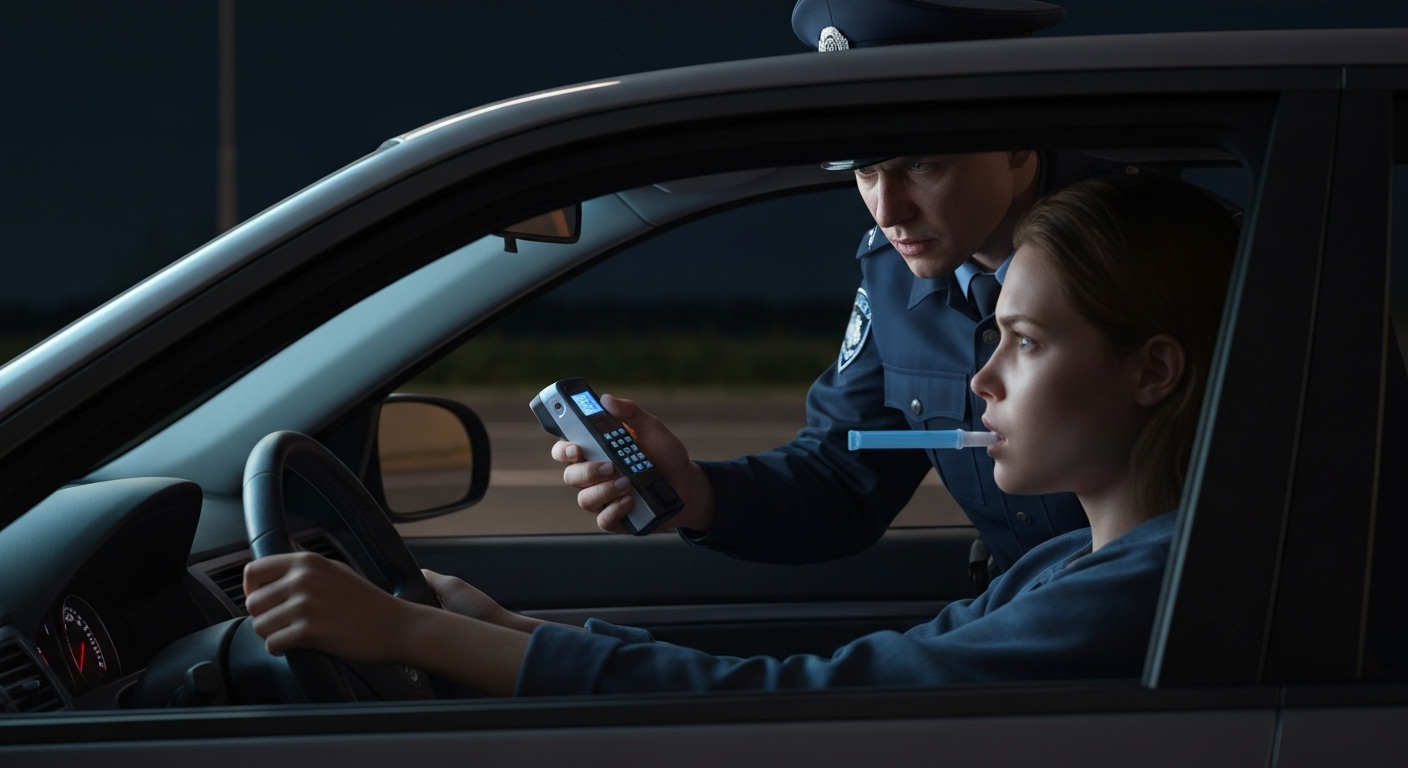BAC Laws, Fines and Consequences in Washington State

Key Highlights
Here are the key takeaways about Washington State’s BAC laws:
- The standard legal blood alcohol concentration (BAC) limit for most drivers is 0.08%.
- Washington State has a stricter BAC limit of 0.04% for commercial drivers and 0.02% for underage drivers.
- Law enforcement uses breath, blood, and urine tests to determine your BAC.
- Penalties for exceeding the legal limit can include fines, jail time, and license suspension.
- A DUI is a gross misdemeanor, but repeat offenses or DUIs causing injury can lead to felony DUI charges.
Introduction
Driving under the influence (DUI) is a serious offense in Washington State. To secure a conviction, the prosecution often relies on a specific measurement: your blood alcohol concentration (BAC). This figure represents the percentage of alcohol in your bloodstream. If an officer has probable cause to believe you are impaired, they can arrest you on suspicion of a DUI. Understanding the legal BAC limits and how they are enforced is the first step in navigating the complexities of a DUI charge.
Legal Blood Alcohol Concentration (BAC) Limits in Washington State
In Washington State, the legal blood alcohol concentration limit isn’t a one-size-fits-all number. The legal BAC limit depends on the type of driver’s license you hold and your age. The Washington Traffic Safety Commission and state laws establish different thresholds to enhance road safety for everyone.
These varying limits recognize the different responsibilities and risks associated with each driver category. For instance, the rules are much stricter for commercial and underage drivers. Let’s explore the specific legal BAC limit for each group.
BAC Limits for Standard Drivers
For most adult drivers operating non-commercial vehicles, the legal blood alcohol concentration limit is set at 0.08%. If your BAC is at or above this level within two hours of driving, you can be charged with a DUI. This means that even if your BAC was lower while you were actually driving, it can be a violation if it rises to 0.08% by the time you are tested.
It is important to understand that the state has the burden of proof. Prosecutors must demonstrate that the BAC test was accurate and reliable and that you were operating the motor vehicle within that two-hour window.
Challenging these elements is a key part of defending against DUI charges. An experienced attorney can scrutinize the evidence to ensure your rights are protected and the procedures were followed correctly.
BAC Limits for Commercial and Underage Drivers
Washington’s DUI laws impose much stricter BAC limits on commercial and underage drivers. For drivers of commercial vehicles, the legal limit is 0.04%. This lower threshold applies to anyone with a commercial driver’s license (CDL) while they are operating a commercial vehicle. The reasoning is tied to the advanced skills required and the significant danger large trucks pose in an accident.
For drivers under the age of 21, the rules are even more stringent. Since it is illegal for them to consume alcohol at all, they can face a DUI charge with a BAC of just 0.02%. This is often referred to as a “zero tolerance” policy.
These lower limits reflect the state’s commitment to preventing impaired driving among drivers who are either professionally responsible for large vehicles or are not legally allowed to drink.
Recent Changes and Proposed Updates to Washington BAC Laws
DUI laws are not set in stone; they evolve over time in response to safety data and legislative trends. While Washington’s core BAC limits have been established for years, discussions about potential changes are always on the horizon as lawmakers aim to reduce traffic fatalities.
Understanding this history and watching for upcoming proposals, such as a potential Senate Bill, can provide insight into the future of DUI enforcement in the state. We will look at how the laws have developed and what changes may be coming.
History of BAC Legislation in Washington
The history of BAC legislation in Washington State reflects a consistent effort to crack down on drunken driving. The current DUI laws, which are aggressively enforced, have been shaped over many years to establish clear lines for what constitutes driving under the influence of alcohol. The establishment of the 0.08% legal BAC limit was a major step in this process, aligning Washington with a national standard.
This framework also evolved to create different standards for specific groups. The introduction of the lower 0.04% limit for commercial drivers and the 0.02% limit for underage drivers demonstrates a more nuanced approach to public safety.
These laws are designed to hold every impaired driver accountable, from a standard driver to a commercial operator. The system of escalating penalties for repeat DUI offenders further shows the state’s long-term commitment to deterring this dangerous behavior.
Upcoming Proposals and Legislative Trends
One of the most discussed legislative trends across the country is the push to lower the legal limit for standard drivers. States like Utah have already lowered their BAC limit to 0.05%, and other states are considering similar measures. This trend is driven by data from organizations like the National Highway Traffic Safety Administration suggesting that impairment can begin at lower BAC levels.
In Washington State, lawmakers in Olympia have previously considered a Senate Bill to lower the legal limit to 0.05%. While such a bill has not yet become law, it reflects a broader movement toward stricter DUI enforcement.
Given these national trends, it is possible that Washington may revisit this proposal in a future legislative session. Staying informed about these potential changes is crucial for all drivers in the state.
How BAC Is Tested and Enforced by Washington Law Enforcement
When law enforcement suspects you of a DUI, they use specific procedures to measure your blood alcohol concentration. After initial observations and possibly field sobriety tests, an officer may request a chemical test to get a precise BAC reading.
The most common methods include a breathalyzer, blood draw, or urine test. It is important to know that refusing to take one of these tests comes with its own set of serious consequences, separate from any potential DUI charges. Let’s examine the approved methods and the penalties for refusal.
Approved Testing Methods and Procedures
Police in Washington use several approved methods to test your BAC, each with its own procedures and level of accuracy. According to the Washington Traffic Safety Commission, these tests provide the evidence needed for DUI charges. The primary methods include:
- Breath Tests: A breathalyzer measures alcohol in your exhaled air to estimate the amount of alcohol in your blood.
- Blood Tests: Considered the most accurate method, a blood test directly measures your blood alcohol content.
- Urine Tests: This is generally seen as the least accurate method, as results can be influenced by factors like hydration.
However, none of these tests are perfect. An experienced attorney can challenge the results by identifying potential flaws. For instance, breathalyzer readings can be skewed by mouthwash or certain medical conditions. Likewise, blood tests can be compromised by contamination or poor record-keeping, creating doubt about the accuracy of the BAC results.
Consequences of Refusing a BAC Test
In Washington, when law enforcement lawfully requests a chemical test, you are required to comply under the state’s “implied consent” law. Refusing to provide a breath or blood sample carries immediate and significant consequences, regardless of whether you are ultimately convicted of a DUI.
If you refuse, the Washington State Department of Licensing (DOL) will automatically suspend your driver’s license. This suspension process is separate from your criminal court case. Under Washington law, you only have seven days from your arrest to request a DOL hearing to challenge the suspension.
Missing this deadline results in an automatic license suspension. Officers are required to inform you of these consequences when they ask for a test. Refusal can lead to a longer license suspension than you might receive for a first-time DUI conviction, making it a serious decision with lasting effects.
Penalties and Consequences for Exceeding BAC Limits
Exceeding the legal BAC limit while operating a motor vehicle leads to severe penalties. A first-time DUI is typically charged as a gross misdemeanor in Washington. However, the consequences escalate significantly for repeat DUI offenders or in cases with aggravating factors.
Penalties can include hefty fines, mandatory jail time, suspension of your driver’s license, and the required installation of an ignition interlock device. The impacts go far beyond the courtroom, affecting your personal and professional life in many ways.
Fines, Jail Time, and License Suspension
A DUI conviction, even for a first offense, brings serious legal penalties. As a gross misdemeanor, it can result in fines, jail time, and a mandatory license suspension. The situation becomes much more severe if the DUI is charged as a felony. This can happen if you have multiple prior DUI cases or if your driving caused serious injury or death.
Felony DUI convictions carry much harsher consequences. You could face over a year in state prison, fines of up to $10,000, and a long-term loss of your driving privileges. The table below outlines how these charges can escalate.
| Charge Level | Common Triggers | Potential Consequences |
|---|---|---|
| Gross Misdemeanor | First DUI offense with no aggravating factors. | Fines, jail time, license suspension, ignition interlock device. |
| Felony | Fourth DUI in 10 years, prior felony DUI, or DUI causing serious injury/death. | Long-term imprisonment (over a year), fines up to $10,000, extended license revocation. |
Impact on Employment, Insurance, and Personal Life
The consequences of a DUI conviction extend far beyond the courtroom. A DUI on your record, especially a felony, can create significant hurdles in your daily life. Many employers conduct background checks, and a conviction could disqualify you from jobs, particularly those that involve driving or are in fields that require professional licenses.
Your finances will also take a direct hit. Auto insurance premiums can skyrocket for an impaired driver, and some companies may refuse to insure you altogether. Finding housing can become more difficult, as some landlords may view a DUI conviction as a risk.
Furthermore, a conviction can limit your freedom to travel. For example, countries like Canada may deny entry to individuals with a DUI on their record. These lasting impacts underscore the importance of addressing DUI charges with a sound legal strategy.
Conclusion
Understanding BAC laws in Washington State is crucial to ensuring both your safety and that of others on the road. With stringent limits and serious penalties for violations, it’s essential to stay informed about these regulations. This blog has covered the key aspects of BAC limits, testing methods, and potential consequences if you exceed those limits. By adhering to these laws, you not only avoid hefty fines and legal troubles but also contribute to a safer community. If you have any questions or need assistance navigating these laws, feel free to reach out for a consultation. Stay safe and informed!help you find a certified installer in your area. Call now – (425) 264-2000.
Call Now or USE contact form a for same-day response:









Thanks to their expertise, the fines were successfully dismissed, and I felt fully supported throughout the process. I highly recommend this attorney to anyone looking for reliable, knowledgeable, and truly dedicated legal help.

